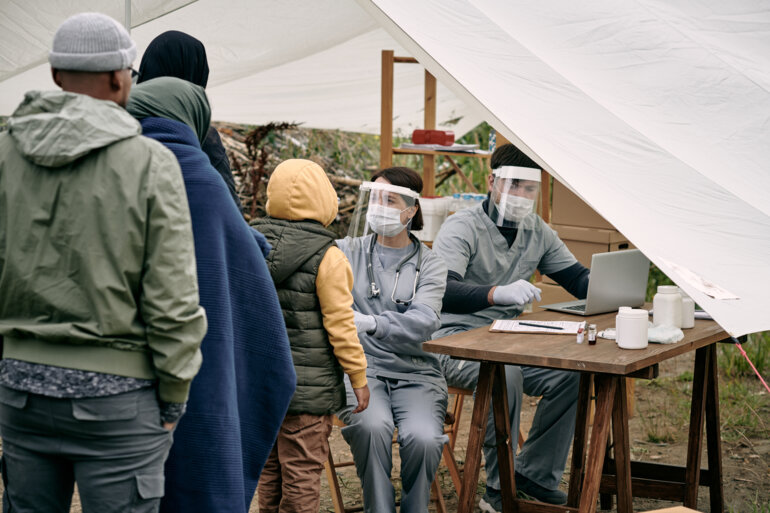Working in Milan, at the centre of the COVID-19 outbreak in Italy earlier this year, Professor Gabriella Pravettoni recalls that, ironically, patients with cancer initially felt more empowered than usual because everyone was as anxious as them about their health.
“In March, there was firstly a feeling that everyone was in the same boat and that people were facing the same fears about death as those with cancer often feel. But this soon changed, as appointments were cancelled and treatment postponed,” says Pravettoni, Director of Psycho-Oncology at the European Institute of Oncology (IEO), Milan, Italy.
Some patients did not go to hospital with symptoms because they were afraid of catching COVID-19 and others were unable to keep appointments because clinics and wards were closed or they could not travel due to lockdown. This spiral of uncertainty and disempowerment extended to patients with cancer who were able to get to hospital. Being unable to take family or friends with them to help ask questions to physicians and understand treatment options put them at a disadvantage in planning care and making informed decisions.
Kathi Apostolidis, President of the European Cancer Patient Coalition (ECPC) points out that, even after lockdown finished, patients faced barriers to getting appointments and achieving an equal partnership with their clinicians.
“For many patients, particularly in the younger and middle age generations, the pandemic has accelerated their empowerment in certain areas, while it slowed it down in other,” she says. “It is worth noting that patients are trying virtual appointments with their doctor, use more mail and mobile health (mhealth) tools like apps, and they are willing to share their data in global registries and clinical trials in the COVID-19 era. The foregoing is the bright side while patients are talking about increased anxiety, financial and economic worries, and fear to catch the virus if they go back to their normal life or passing it to family or others.”
Despite the negative impact of the pandemic, which is likely to be exacerbated with further dissemination of the coronavirus, the lessons learned in recent decades about patient empowerment can still enable oncologists to establish successful relationships and patient involvement in their treatment in the COVID-19 era.
Patient empowerment is defined in many ways. While the World Health Organisation interprets patient empowerment as ‘a process in which patients understand their role, are given the knowledge and skills by their healthcare provider to perform a task in an environment that recognises community and cultural differences, and encourages patient participation’ (WHO, 2009). Building on the definition provided by the EU Joint Action on Patient Safety and Quality of Care (PaSQ), the European Patients Forum called empowerment ‘a process through which people increase their capacity to draw on their personal resources in order to live well with chronic conditions in their daily life, as well as navigate the health care environment’ (EPF Brief: Patient empowerment). Within the EMPATHiE (Empowering patients in the management of chronic diseases) project, three essential elements of empowerment were identified: education, joint decision-making and self-management.
More recently, the European Academy of Cancer Sciences-EACS, the ECPC and other organisations drew attention to the empowering effects of participation in research for patients, making them feel valued and respected (Mol Oncol. 2020 Aug; 14(8): 1589–1615). It was also stressed the importance of involving patients and patient organisations in prioritising therapeutics, outcomes, health economic and inequalities research.
Where do we stand in oncology?
Empowerment can be seen as a two-dimensional process where both inter-personal and intra-personal dimensions coexist, explains Pravettoni (Patient Educ Couns. 2007 Apr;66(1):13-20).
“The inter-personal process relates to the sharing of power between doctor and patient and is based on education and communication, while the intra-personal dimension relates to personal transformation in which an individual creates power from within themselves,” she says.
Pravettoni clearly differentiates between patient empowerment, patient engagement and patient information. She points out that giving patients the right information about their disease is an important first step and engaging with them about managing their disease and making decisions comes next. However, empowerment has broader implications.
“An empowered patient is able to self-manage his or her disease and treatment and, by participating and negotiating with physicians, has self-determination of health and treatment-related goals. Such patients show greater adherence to treatment and have better quality of life,” she says.
“Still today, very few new cancer patients feel empowered or understand their role in the relationship with their doctor”
To Apostolidis, “empowerment is knowledge” because knowledge enables patients to feel confident in articulating their questions and opinions and challenging what their clinician is telling them. When she was diagnosed with breast cancer in 1990, patient empowerment was in its infancy and she found little information in her own language to help her make decisions about her treatment. The Internet and new digital technologies have changed that scenario beyond recognition, she says, though empowerment does not come immediately.
“Things have changed a lot in the last 30 years,” she comments, “but, even today, very few new patients feel empowered or understand their role in the relationship with their doctor. It doesn’t matter how well educated they are or their socioeconomic group, it’s only later, when patients have started treatment or are having problems, that they acquire the knowledge – from the Internet or through support groups – to start asking questions.”
New boost from virtual consultations
During the first peak of the pandemic, telemedicine helped to restore doctor-patient communication in areas where it was used.
At some cancer centres, virtual consultations were used to relieve anxieties and maintain patient empowerment – at least in patients who were either not on active treatment or whose symptom relief or chemotherapy could be supervised remotely.
“Telemedicine has been very empowering for some patients. They are able to see their doctor in the relaxed environment of their own home without having to travel or to wait anxiously in clinics. This enables everyone to get more out of the consultation,” says Pravettoni.
She feels that telemedicine offers opportunities for the future, including after the pandemic, in reducing distress for patients who don’t need hospital appointments.
“Instead of spending time and money travelling to hospital clinics and arriving tired and anxious for their appointments, they can take more time organising their questions and feeling well prepared for talking about their cancer and sharing decisions with their doctor. I hope that everyone will see that telemedicine brings real added value, including for patient empowerment,” she says.
However, much will depend on the ease of accessing telemedicine, as this is very variable across Europe and globally.
“In many countries, patients are unable to see their doctor online or, if they are elderly, it may be impractical. Some patients are even uncomfortable talking to their doctor on the telephone,” points out Apostolidis.
Establishing wider availability of telemedicine in oncology, and optimising its application, will undoubtedly take time. Introduced as an emergency option during the most chaotic times that most clinicians will have ever worked through, telemedicine will only reveal its full potential in sustaining patient empowerment when the digital divide has been addressed.
Respecting patient wishes
Much of the progress towards patient empowerment of the last two decades can be attributed to the rise of precision medicine and its impact on the chronicity of cancer, suggests Pravettoni. As patients with many forms of cancer live longer, they want to take an active and informed role in managing the physical, psychological and social aspects of their health.
“In personalising treatments to patients, we have also personalised their involvement in the decision-making process”
“In personalising the treatment to individual patients, we have also personalised their involvement in decision-making. As a result, we may have seen more progress in patient empowerment in oncology than in some other specialties where there has been less change in how diseases are managed,” says Pravettoni.
Research has shown that time, continuity, patient centerdness, mutual acknowledgement and relatedness are the main features of an empowering relationship (Health Soc Care Community. 2014 Mar;22(2):210-24). Apostolidis adds ‘listening’ skills of physicians. “Even now, some doctors find it hard to listen to patients explaining the reason that brought them to their practice, and US surveys have shown that they typically interrupt patients within one minute of the patient starting to talk about themselves,” she says. “If doctors listen, they will get clues that will help them make the diagnosis and understand the needs of the patient.”
Pravettoni agrees. “It is important to construct a positive atmosphere, demonstrate interest and not be judgmental, pay attention to the patient’s priorities and concerns, and to support the patient’s autonomy. They need to be actively encouraged to participate in the consultation and decision-making and to express their emotions, and they need to be given time to make decisions,” she says.
She stresses that, if oncologists do not have the time and resources to facilitate patient empowerment, they should seek help from psychologists and other relevant disciplines in order to avoid burnout. “We need to empower oncologists as well as patients, and oncologists need to understand that they don’t have to be only good scientists and researchers to be good oncologists. It’s just as important to be a good doctor who is empowering patients,” says Pravettoni.
Despite years of progress toward empowerment in oncology, some patients are still reluctant to take steps towards empowerment and shared decision-making.
Culture plays a significant part in attitudes to empowerment and it can be difficult to change generations of acceptance of a paternalistic approach where the doctor is seen to know best and patients resist engaging in discussions. Apostolidis explains that some issues, such as advance directives, can be particularly difficult for doctor and patient to discuss.
“In the US, advance directives are widely discussed but, in Europe, no one dares to talk about them. Talking about adverse outcomes and death is seen as too negative, but if patients are to be truly empowered, these issues need to be included in discussions and patients’ wishes respected,” says Apostolidis. “Unfortunately, advance directives have not always been respected during the COVID-19 pandemic, but I do understand that, in intensive care units, doctors are treating hundreds of patients and working in very difficult conditions.”








